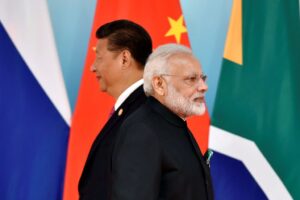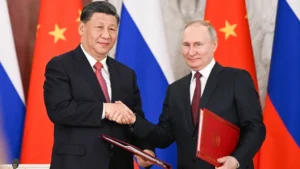Tair Omarov, a sinologist and oriental studies expert born in Kazakhstan, lived in China for 14 years, helping large businesses establish business contacts. He is fluent in Chinese, English, and Russian. Tair has traveled extensively throughout Southeast Asia and the Middle East. He currently lives in Dubai, where he is developing his own business. He also runs a blog where he writes about the realities of China and other topics.
https://www.facebook.com/jagertnow
https://www.instagram.com/tair_omarov
All International Alliances on the World Stage
All international alliances on the world stage are generally divided into two types: military and economic. When we talk about alliances with a military focus, the most well-known examples are NATO, CSTO, and AUKUS. When it comes to economic alliances, there is the European Union, ASEAN, the Eurasian Economic Union, etc.
BRICS stands apart from all these alliances. The major member countries have repeatedly stated that this alliance does not aim to unite “against someone,” as many similar organizations do. It is important to understand that BRICS is not a purely military or economic bloc — it is an alliance of countries with emerging economies, aimed at multilateral cooperation and addressing global challenges outside the framework of traditional Western influence.
BRICS in 2024
In 2024, BRICS represents an international coalition that includes five key countries with emerging economies — Brazil, Russia, India, China, and South Africa. These countries hold an important place in the world economy, accounting for almost half of the world’s population and over 30% of global GDP. Over the past few years, especially in the context of global economic and political changes, BRICS has evolved into a platform for discussing alternative development paths and deepening cooperation beyond the scope of traditional Western institutions.
Nevertheless, BRICS currently lacks a common currency, and no active discussions are being held on its creation. Additionally, there are no mutual tariff exemptions on goods or free trade zones, which are common in economic unions. BRICS remains an alliance based on multilateral dialogue and cooperation without strict economic commitments among member countries.
BRICS has no established organization or headquarters. The only officially created body within BRICS is the New Development Bank (NDB), also known as the BRICS Bank. This bank was established to finance infrastructure and sustainable projects in member countries, and is currently headed by former Brazilian president Dilma Rousseff. This underscores the importance of BRICS’ financial component and the bloc’s drive to create alternative financial mechanisms to strengthen economic independence from Western institutions.

Xi Jinping and Narendra Modi. Photo
China at the 2024 BRICS Summit
The BRICS 2024 summit was an important milestone for China, showcasing its leadership ambitions and its desire to deepen cooperation with developing countries. Amid global uncertainty and rising tensions with the West, China’s participation in this summit was of great significance not only for itself but also for the entire alliance. Let’s take a closer look at China’s participation in the summit and its influence on the BRICS agenda.
China’s Key Proposals and Initiatives
At the BRICS 2024 summit, China presented several initiatives aimed at strengthening economic ties between the bloc’s members. Special attention was paid to creating conditions for increased mutual investment as well as cooperation in infrastructure and high technology. China proposed a new fund to support joint projects in BRICS countries, which is intended to facilitate the implementation of infrastructure projects in sectors such as energy, transport, and digital technologies.
China also emphasized enhancing cooperation in climate resilience, proposing to create a platform for exchanging technology and experience in combating climate change. This proposal was met with approval, as environmental issues are becoming increasingly relevant for the countries of the alliance.
Geopolitical Context and China’s Interests
In the context of ongoing rivalry with the United States and general trends toward deglobalization, China is actively seeking to strengthen its influence in international organizations like BRICS. At the 2024 summit, China acted as a key proponent of deepening economic and political cooperation within the bloc, emphasizing the importance of joint efforts to counter external pressure and create alternatives to Western institutions.
China aims to develop BRICS as a counterbalance to Western blocs such as NATO and the G7. Thus, the 2024 summit marked an important step in China’s strategy to strengthen ties with developing countries and to create multilateral mechanisms that could offset the influence of the United States and its allies on the world stage.
Interaction with New and Existing BRICS Members
One of the key topics at the summit was the expansion of BRICS membership. China actively supported the acceptance of new members, seeing this as an opportunity to increase the economic and political weight of the bloc. The accession of new countries to BRICS allows China to strengthen its influence and expand economic cooperation, particularly in regions like Africa and Latin America.
Moreover, China emphasized the importance of equal cooperation among all members of the bloc, aiming to strengthen unity and cohesion amid increasing pressure from Western countries.

Economic Cooperation and Specific Projects
China actively promoted the Belt and Road Initiative as part of economic cooperation within BRICS. During the summit, projects to develop transport and energy infrastructure were discussed, aimed at connecting BRICS countries, improving logistics, and promoting trade growth. Particular attention was given to switching to national currencies for transactions, which should reduce dependence on the US dollar and strengthen the financial independence of the bloc members.
China also proposed creating a special mechanism to support small and medium-sized enterprises (SMEs) in BRICS countries, providing easier access to financing and stimulating local economic development. These measures are aimed at creating closer economic ties within the bloc and increasing the share of intra-BRICS trade.
Summit Outcomes and Future Prospects
The BRICS 2024 summit, despite high expectations, did not result in any major announcements or significant agreements. There were no sensational agreements reached in either the economic or political spheres, raising the question — what was the purpose of this summit? The answer lies in the very nature of BRICS: the 2024 summit was more of a demonstration of solidarity and the potential of member countries rather than a venue for major decisions.
Special attention should be given to the fact that Saudi Arabia and Argentina, despite submitting applications and successfully completing all necessary procedures, have not yet joined the bloc as planned in 2024. Nevertheless, interest in BRICS remains high — countries like Turkey, Azerbaijan, and Malaysia are considering joining, highlighting BRICS’ appeal for emerging economies in times of global instability.
The key player in BRICS is undoubtedly China. For China, this summit was an important step in demonstrating that BRICS could become an alternative to Western institutions, symbolizing multipolarity and the potential for growth. This is one element of China’s broader strategy to counter US influence. The primary objective of the summit was to show the West that BRICS is not only actively developing but also attracting new participants.
Thus, the 2024 summit was primarily a demonstration of potential — the possible power and attractiveness of BRICS as an alternative to existing Western institutions. It serves as a signal to the world, especially to the United States and its allies: BRICS continues to grow, and its influence could become a significant counterbalance in the future. Smaller countries seeking to join use their intentions as leverage against the West to gain more favorable conditions. The 2024 summit symbolized that, despite the lack of significant outcomes, the union of BRICS countries represents an important element of a future multipolar world order and an alternative to traditional Western blocs.
Read/Watch more about China: China vs USA


Leave a Reply